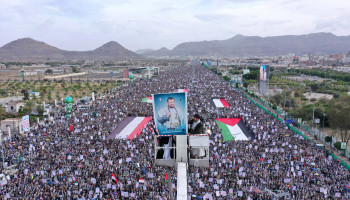Unending US Arms Sales to Saudi Arabia: Report
الثلاثاء, 16 يونيو 2020

Saudi Arabia's appetite for weapons has grown as its regional ambitions have increased and the ongoing war in Yemen.
According to the Stockholm International Peace Research Institute (SIPRI), 70 percent of Saudi's arsenal now comes from the United States.
Saudi Arabia and its partner, the United Arab Emirates, have relied heavily on airstrikes in all Yemeni areas.
The United States’ arms sales to Saudi Arabia are flawed in humanitarian, economic and political terms. Rather than search for innovative ways to justify protecting arms sales to Saudi Arabia, the United States can and should work to legitimately foster sustainable peace and stability in the Middle East.
In short, the United States ought to reverse its wrongs by ending its arms sales to Saudi Arabia. Doing so will not only allow war-torn Yemen to begin to recover, but would also allow the United States to better revitalize its own economy, and reassert its military leverage and international authority to hold allied states like Saudi Arabia accountable for their agendas and actions.
Since the late 1990s, the United States has been the world’s leading weapons exporter. The weapons exportation industry hauled in $55.6 billion in 2017, $18 billion of which came from Saudi Arabia.
In May 2017, President Donald Trump visited Saudi Arabia on his first foreign trip while in office. Trump signed a new arms deal with Saudi Arabia that will allegedly generate more than $110 billion. The deal cuts regulations, reduces wait times and claims to expand job opportunities for American industries. However, even without that deal, Saudi Arabia would remain the largest consumer of US weapons exports. Under the Trump administration,
The United States has sold $928 million in laser-guided missiles, $98 million in ammunition and $95 million in bomb systems.
The United Kingdom transferred $843 million worth of arms in 2016, but only $438 million in 2017. French exports dropped from $174 million in 2015 to $27 million in 2017. These decreases have tightened the flow of weaponry, from missiles to bombs to firearms, into Saudi Arabia.
"There's been a very significant growth in arms supplies to Saudi Arabia by the US," says SIPRI's Pieter Wezeman, a senior researcher and Middle East specialist. "To Saudi Arabia, the US supplies a very wide range of arms.
The most important types of arms include combat aircraft, tanks and missiles. It includes very advanced sensors and intelligence gathering equipment, often on planes. So, really, the whole package of weapons which Saudi Arabia wants to have is what the US is willing to supply and already has supplied."
Selling arms to Saudi Arabia has long been controversial because many view the sales as aiding Saudi Arabia in worsening the humanitarian crisis in Yemen.
The US arms sales to Saudi Arabia are deeply troubling for three reasons: they exacerbate the humanitarian crisis in Yemen, hurt the American domestic economy and are detrimental to American foreign policy. Shutting the door on Saudi arms sales will allow the United States to stop indirectly promoting conflict orchestrated by Saudi Arabia and to better improve its domestic economy. Ending arms sales will also reassert American authority in its relationship with Saudi Arabia, an allied state that benefits from US partnership without meaningful accountability.
Weapons produced and provided by the US have facilitated the deaths of innocent civilians in Yemen. US bombs produced by Lockheed Martin killed forty children on a school bus in August 2018. A similar strike killed 155 people in a funeral hall, and 97 people were killed at a Yemeni market by a bomb from the United States and many daily massacres in Yemen.
The United States continually refuels the coalition aircraft that is used to kill a large number of civilians in coalition airstrikes; US-made munitions have been found at numerous attack sites, ranging from hospitals to weddings. In Yemen alone, over half of civilian deaths have been caused by Saudi airstrikes that targeted hospitals, funerals, schools and refugee camps. The Saudis have blockaded food and supplies from entering Yemen in coordination with the United States as well.
While US arm sales are not the sole cause of the geopolitical and humanitarian crisis in Yemen, arms sales certainly enable conflicts to persist and proliferate.
Ending US arms sales to Saudi Arabia will help resolve the war in Yemen.
Ending the arms sales will also lift the veil on the Trump Administration’s disingenuous economic justifications for politically expedient Saudi relations. The Trump Administration has long used economic arguments to cover for their political and military desires. However, the arms sales to Saudi Arabia transcend economics. By maintaining Saudi arms sales, the United States is declining to hold countries accountable in exchange for the comfortable benefits offered by the status quo.
The administration has attempted to simplify the arms sales issue to make the controversy appear more palatable. In reality, the arms sales are diverting American dollars to a sector that is relatively ineffective at job development, implicitly condoning human rights abuses that stem from those sales and harming American foreign policy itself.
Yemen will remain for some time a poor, fragmented and unstable country. But we can help remove one layer of instability in a region overflowing with it, reduce unspeakable human suffering, diminish America’s military entanglement and set the stage for the difficult diplomacy that will follow.
Source: Saba
Y.A






